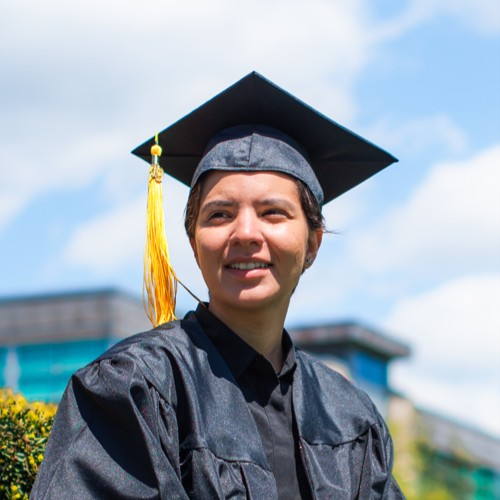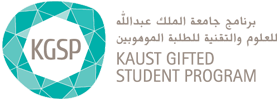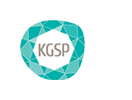Alumni Profile: Rund Tawfiq
4/19/2024

Image 1: Rund Tawfiq, KGSP Alumna, University of Massachusetts-Amherst ’19.
Meet Rund Tawfiq, a KGSP Alumna of Cohort-6 from Dhahran, whose journey from her undergraduate studies at the University Massachusetts Amherst has taken her to perform groundbreaking research at KAUST's Bio-Ontology Research Group (BORG). Rund's interdisciplinary work spans biology and computational biology, aiming to decode the secrets of microbial communities in Saudi Arabia's “Empty Quarter” (Rub’ al Kahli). Beyond her research, she co-founded WISER (Women in Science & Engineering Research) at KAUST, advocating for gender equality and mentorship in STEM. With a commitment to innovation and science communication, Rund is poised to make a lasting impact on the global scientific community.
Tell us about where you come from and what got you interested in STEM.
I'm from Dhahran, and I'm what you would call an “Aramco baby”. I was born in Aramco, literally. My family still lives there. Everyone I know who is related to me works there. They do all sorts of things; some people are into science, and some people are into business or administration. I respect the company a lot, and it's given a lot of opportunities in my region, of course, but I had different interests growing up. I went to a private school in Dhahran that taught us a lot of things outside of the academic curriculum that got me interested in science. I've been doing research since I was 15 or 16 years old because of those opportunities. I realized it's something that I really wanted to do, and I decided not to follow the path of everyone I knew and do something different. I have a very supportive family, so I went for it.
Tell us a little bit about your undergraduate experience. What sorts of things did you become interested in while studying at the University of Massachusetts Amherst?
UMass Amherst is a very large state school, so the first year was really overwhelming. There was something like 20,000 students, and most of them were from Massachusetts so they already knew each other from high school. It wasn't easy to blend in, but then I started doing more extracurricular things. I was in the Arab Students Association. There weren't a lot of international students so that's how I met most of them. In the second or third year, I started taking smaller classes because they were more specialized, and I got more interactions with my professors than in the first year.
I particularly liked this small neuropsychology class that I took; I think we were like eight students. I got along well with the professor, and I started working in her lab. She was studying postpartum depression using rats as models. Taking care of rats and doing rat brain surgery during my undergrad was a super fun thing for me, but I realized that working on animal models wasn't something that I wanted to do for the rest of my life, but I was grateful for that experience. When I finished my undergrad and started working here at KAUST, my master's was in biology but with a neuromuscular junction, which I probably would not have gotten into if not for that experience.
Did you encounter any challenges as a student?
Yeah, there were so many challenges during my undergrad. I’m good at the kind of work I do, but I'm not great at being in an institution and doing things by the book. I struggled because college and grad school are very structured, but each professor has their own teaching style, so there's not one strategy for you to just ace everything or keep up a specific GPA.
So, I formed study groups and got tutors, which was very helpful. The same applied during my master's. Although the smaller student-faculty ratio made it easier to reach out directly to professors, I've participated in study groups for every class I've taken. If I know the concepts well, I'll help lead the group; if not, I'll just go and listen. I find it very helpful because explaining things to others or having concepts explained by peers helps me understand them on a deeper level compared to just learning from people who already know so much about the topic.
Did the strategy of seeking academic support come easily for you?
I guess for me, it was never an issue of asking for help. It was just not knowing that that was the right thing to do. I just thought “I need to work more. I need to work harder”. But at some point, [my KGSP Advisor] was the one who convinced me to get a tutor. And it drastically improved my grades like magic.
How did you become involved with WISER (Women in Science & Engineering Research) at KAUST?
Sarah Alsawaf (KGSP Cohort 5) is the person who founded WISER. She contacted me, and I agreed to join.
At KAUST we have an extremely low proportion of female faculty, and the male-to-female student ratio is quite low as well. It is like that for all academia and not exclusive to KAUST, but because KAUST is a graduate school only for STEM, it's magnified. We noticed from our own experiences that it's a cycle that's really hard to break. So, the idea for WISER was to have an organization that could be supportive of women in STEM, whether it was raising issues for the university or just as a social group where you can meet other women who aren't in the profession and connect female faculty with female students.
What sorts of activities does WISER organize?
We have some specific months here at KAUST where things are really stressful, so we organize “de-stress sessions” to just hang out and talk about our experiences. We also host a lot of events like coffee breaks throughout the workday where we'll specifically invite female faculty because we don't get many one-to-one interactions with them. They're quite busy people, and not a lot of people have the courage to just go and approach a professor and start having a casual conversation. But in this environment, it's just coffee, and we're all hanging out for that purpose, so they feel more approachable. And of course, our group is not exclusive to female students. We need males as well to reach the right balance, and males have to be an active part of this equality. So yeah, it was mostly social events. We still kind of do the same things. We have more things planned for this year, like some workshops.
Besides these events, what we have been doing is also helping a lot of female students when they have any kind of complaint or issue that they want to relay to Graduate Affairs here on campus. We’ve done things [like] anonymously reporting on students’ behalf and supporting them through reporting processes for misconduct, because it's a quite a difficult system to navigate, and almost all the people you interact with through the process are males. So, it provides a more supportive environment where they feel like they can be heard.
What progress have you seen as a result of the work WISER is doing?
We've seen some actual changes to the Student Handbook, such as specific language referring to problems that we raised. And of course, that's not only a product of our work. A lot of people in administration, students, and staff have been pushing for the same thing. We worked a lot with the head of Graduate Affairs, and he helped us out with some processes for reporting misconduct or harassment, and we followed these processes to the end. They take much, much less time now.
You’re currently working with the Bio-Ontology Research Group (BORG) as a part of your PhD program. Can you explain the work that you're doing in this research group, and how you got involved?
When I began my master’s program at KAUST, I joined Professor Takashi Gojobori in the Computational Bioscience Research Center (CBRC). My master’s was in Biology, and I did a lot of biological work in the lab, but at the same time, [Professor Takashi] encouraged me to start getting into computational biology because that's where the field is headed, and recommended that I join the Bio-Ontology Research Group (BORG).
BORG is a computer science group led by my PI, Professor Robert Hoehndorf. I build tools to analyze biological and environmental data. Right now, I'm working on a machine-learning model that predicts the functions of bacterial communities. The biggest project in my PhD Is associated with the “Empty Quarter” (Rub’ al Kahli) of Saudi Arabia. The Empty Quarter is in the southern part of the country, and it's literally a quarter of our land mass; around 1500 kilometers of just sand and not a single human being. It's a very, very arid desert and temperatures are brutal. I think they reach the mid-fifties in the summer. We cross the empty quarter from the east to the west and take samples every 15 kilometers. I extract DNA from the samples and use my model to predict functions [of bacterial communities]. The impact of this work is to understand where we're headed in terms of desertification because that land mass is a good model of what our planet is going to look like with rising temperatures. There are also parts where there's a lot of vegetation, so it's interesting to see how these bacteria are helping the plants grow in such a harsh environment.
How have the skills that you've developed through undergrad as a KGSP student contributed to the work you’re doing now with BORG?
In undergrad, I learned a lot of the actual skills related to working in the lab. Biology depends a lot on skill and your actual knowledge of the subject. Also, one of the biggest things that helped me when I was in KGSP was when I did summer enrichment at UT Austin. When I was there, I was working with a professor who studied bats and was doing a lot of field research. It was really interesting for me; waking up at 5 am trying to get to the bat cave before the bats left.
I realized that I like seeing my science in action and not just staying in the lab. I like experiencing the environments that I'm studying. There's a huge gap between computational biology and actual biology. Biologists aren't that good at using computational models, and people who build these models don't often know a lot about biology. So, it turns out that sometimes the models are not applicable, or people don't know how to use them. It was a point for me and my PhD to make it as interdisciplinary as possible. I decided to kind of push for doing field research, doing lab work, and at the same time building models and taking it all the way from the computational part to biological conclusions that could be useful for the world.
What's one piece of advice that you would give to a younger version of yourself or a current KGSP student?
Trust the process. I always wanted to have concrete plans, but my interests were changing. My passion was science, but my interest in what kind of science or what kind of labs I wanted to work in was dynamic. I would have wanted to be more comfortable with that. I was trying too hard to set a specific purpose and to do a specific kind of research. But over time, I noticed that it's okay to branch out, and having these very different experiences and being open to them has helped me so much in being able to progress through my PhD and do something unique and useful. I can bring all these different experiences together into one big thing.
Besides your work with WISER and BORG, is there anything else that you're planning for the future?
Now that I'm progressing quite far through my PhD, I’m looking forward to having more opportunities to talk about my work to people who aren't specifically scientists. I'm looking forward to opportunities to communicate science and try to get more people into it.

